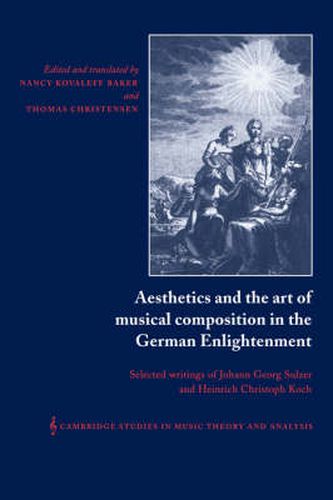Readings Newsletter
Become a Readings Member to make your shopping experience even easier.
Sign in or sign up for free!
You’re not far away from qualifying for FREE standard shipping within Australia
You’ve qualified for FREE standard shipping within Australia
The cart is loading…






Can an abstract theory of Empfindsamkeit aesthetics have any value to a musician wishing to study composition in the classical style? The eighteenth-century German theorist and pedagogue Heinrich Koch showed how this question could be answered with a resounding yes. Starting with the systematic aesthetic theory of the Swiss encyclopedist Johann Sulzer, Koch was creatively able to adapt Sulzer’s conservative ideas on ethical mimesis and rhetoric to concrete problems of music analysis and composition. In this collaborative study, Thomas Christensen and Nancy Baker have translated and analysed selected writings of Sulzer and Koch, respectively, bringing to life a little known confluence of philosophical and musical thought from the German Enlightenment. Koch’s appropriation of Sulzer’s ideas to the service of music represents an important development in the evolution of Western musical thought.
$9.00 standard shipping within Australia
FREE standard shipping within Australia for orders over $100.00
Express & International shipping calculated at checkout
Can an abstract theory of Empfindsamkeit aesthetics have any value to a musician wishing to study composition in the classical style? The eighteenth-century German theorist and pedagogue Heinrich Koch showed how this question could be answered with a resounding yes. Starting with the systematic aesthetic theory of the Swiss encyclopedist Johann Sulzer, Koch was creatively able to adapt Sulzer’s conservative ideas on ethical mimesis and rhetoric to concrete problems of music analysis and composition. In this collaborative study, Thomas Christensen and Nancy Baker have translated and analysed selected writings of Sulzer and Koch, respectively, bringing to life a little known confluence of philosophical and musical thought from the German Enlightenment. Koch’s appropriation of Sulzer’s ideas to the service of music represents an important development in the evolution of Western musical thought.